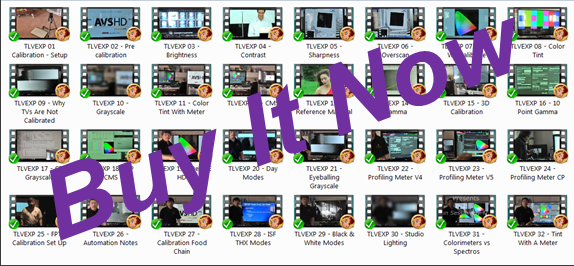 This is from an answer to a person defending the usefulness of copying calibration settings because he said that “people know a good picture when they see one.”
This is from an answer to a person defending the usefulness of copying calibration settings because he said that “people know a good picture when they see one.”
Uh … actually not.
What is the value of an uninformed opinion? I don’t know anything about that topic, but I do still have an opinion on it. Hmmm, now what is that kind of opinion actually worth? Something like ZERO or even less than ZERO.
Are the only choices that people have only to copy settings versus paying for a professional calibration? Anyone that thinks this is clearly not thinking with his head. Verbalizing it makes it even worse. Remove all doubt.
What about the 25 cent solution that will lead to a better end result versus copying settings? Anyone can get the free AVSHD test disc and follow the instructions. DVD burners are in practically every computer out there especially if people have the ability to even go online to search for those copied numbers in the first place. The AVSHD test disc will be better than copying settings all the time and it will actually make the user learn something along the way.
“People will recognize a good picture …” Aside from the word “good” being completely relative here; one person’s idea of good is another person’s mediocre or awful. I’ve had the displeasure of seeing plenty of people watching the dynamic mode of their TV and they consider that to be “good.” In the really old days, I had clients that had RPTVs that were massively out of focus and they watched that and thought that was a “good” picture too. How do you even pretend to try to reconcile this?
A Big Mac is good food too, if you don’t know any better (and I like Big Macs). Everyone says they are good drivers … but how can that be? We have car accidents every day. Clearly the concept of “good” is just entirely subjective and the more you look at it critically, the more useless the word gets in terms of defining some absolute.
How about doing people a favor and get them a free test disc … too bad it forces people to think about what they are doing rather than behaving like human parrots. Still want to copy numbers after this, then it reveals so much about the person in question. The unwillingness to learn means that they actually don’t care about getting real solutions that work. They have actually placed a value on the idea of getting a good picture and that value is ZERO.
If I throw a bunch of numbers in front of you (with one of these numbers representing the correct answer) and you don’t know what the right answer is, nor do you even understand the question, will you just pick the right numbers because you inherently know what a “good” answer should be? And how dare someone question your ability to discern good from bad!!
The collected data shows that copying numbers has a 4% chance of ending up measurably better than where a person starts out and this was on a TV brand that was known for having very tight tolerances. (Pioneer Elite Kuro plamsa sets 2008-2009) They have a 96% chance of ending up no better or potentially worse than where they started … again … measurably worse, not some emotional proclamation.
The problem here is again with the end user and their understanding of what constitutes better and what is worse. If people inherently knew this, then we wouldn’t have blue looking TVs in the first place, but we do … which means that people don’t inherently know what a good picture really looks like. [important]“You don’t know what you don’t know”[/important]
The marketing principle comes in here. The marketing of a TV set has nothing to do with presenting accurate images; it has everything to do with selling more TVs. As it turns out, accurate images don’t sell to the uninformed masses … TV makers already figured this part out 40 years ago. If people buy more TVs if you make pictures green, then you make them green. It’s about selling TVs. Does that make the picture objectively better?
Since people don’t know what the right answer actually is … copied numbers just give them another wrong answer … just different than the wrong answer they currently have. Even if they were lucky to be in that 4% that got measurably better, they wouldn’t know it anyway. The concept of “good” is only worth something if you have the understanding to go with it; that you can tell me why it is “good.”
The only way to know how good or bad those settings really are is to measure what they have, but if they could do that, they wouldn’t be copying settings in the first place. So the ignorance continues and it feeds on itself with no end in sight.
For more information on the whole notion of copying settings, go read this article. I’ve updated it and added a portion on why copying may not be an evil thing in its entirety.





